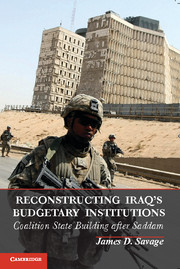Book contents
- Frontmatter
- Dedication
- Contents
- List of Tables
- List of Figures and Illustrations
- Preface
- Abbreviations
- 1 State Building and the Reconstruction of Iraq’s Budgetary Institutions
- 2 The Evolution of Iraqi Budgetary Institutions from the Ottomans and the British Mandate through Saddam
- 3 Prewar Planning for Iraq’s Economic and Budgetary Reconstruction
- 4 Boots on the Ground
- 5 Building Iraqi Ministerial Capacity
- 6 The 17th Benchmark and the Challenge of Iraqi Budget Execution
- 7 Building Iraqi Budgetary Capacity
- 8 Iraqi Budgeting
- 9 Successful State Building in Iraq?
- Bibliography
- Index
- References
6 - The 17th Benchmark and the Challenge of Iraqi Budget Execution
Published online by Cambridge University Press: 05 June 2014
- Frontmatter
- Dedication
- Contents
- List of Tables
- List of Figures and Illustrations
- Preface
- Abbreviations
- 1 State Building and the Reconstruction of Iraq’s Budgetary Institutions
- 2 The Evolution of Iraqi Budgetary Institutions from the Ottomans and the British Mandate through Saddam
- 3 Prewar Planning for Iraq’s Economic and Budgetary Reconstruction
- 4 Boots on the Ground
- 5 Building Iraqi Ministerial Capacity
- 6 The 17th Benchmark and the Challenge of Iraqi Budget Execution
- 7 Building Iraqi Budgetary Capacity
- 8 Iraqi Budgeting
- 9 Successful State Building in Iraq?
- Bibliography
- Index
- References
Summary
In response to the increasing violence and the deteriorating security situation that engulfed Iraq in 2005 and 2006, the Bush administration released its “New Way Forward” strategy in February 2007, which ordered the surge in U.S. troop levels, promoted counterinsurgency efforts, and renewed efforts to bring “essential services” to the Iraqi people. The Iraqi government would never gain the people’s confidence and successfully deter violence, American officials reasoned, unless the government delivered on its promises to rebuild the country’s infrastructure and provide basic services, such as electricity and water. Providing these services meant spending more money, not just Coalition and donor funds, but a focused target of spending more Iraqi money.
Encouraging and assisting the Iraqis to spend their money became part of American law. As part of the 2007 appropriations that helped fund the new strategy, the legislation established eighteen benchmarks that evaluated American progress in Iraq. The 17th Benchmark measured Iraqi success in “allocating and spending $10 billion in Iraqi revenues for reconstruction projects, including delivery of essential services on an equitable basis.” The two key words in the benchmark are “allocating” and “spending.” Allocating refers to the processes of budget formulation and adoption by designated political authorities. Spending refers to budget execution and the actual expenditure of funds. By 2007, with the guidance of CPA Order 95, the Financial Management Law, the Iraqis could reasonably draft a budget, eventually get it adopted through the political process, and spend its operational budget, which essentially paid government salaries and pensions. What the Iraqis could not do very well was spend their investment budget for capital projects. By the end of 2006, Coalition reconstruction, civil service training, and ministerial and provincial assistance efforts focused on helping the Iraqis execute the capital budget. Thus, the 17th Benchmark and the spending of the capital budget became a significant measure of the success of Coalition and Iraqi governance. This chapter examines the pressures on the Coalition to encourage Iraqi spending, the origins of the 17th Benchmark, its strengths and limitations as a metric, and the role budget execution served in promoting Coalition budgetary state building in Iraq.
- Type
- Chapter
- Information
- Reconstructing Iraq's Budgetary InstitutionsCoalition State Building after Saddam, pp. 144 - 171Publisher: Cambridge University PressPrint publication year: 2013



